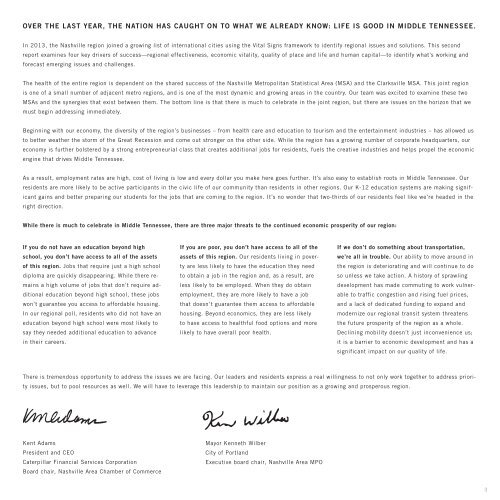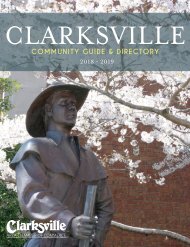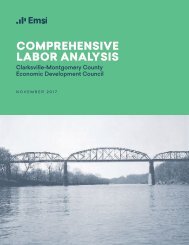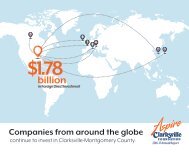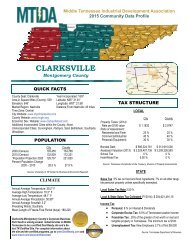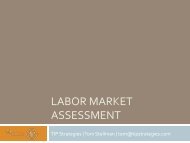o_19l9j223vvmv2drsq2158817sia.pdf
You also want an ePaper? Increase the reach of your titles
YUMPU automatically turns print PDFs into web optimized ePapers that Google loves.
OVER THE LAST YEAR, THE NATION HAS CAUGHT ON TO WHAT WE ALREADY KNOW: LIFE IS GOOD IN MIDDLE TENNESSEE.<br />
In 2013, the Nashville region joined a growing list of international cities using the Vital Signs framework to identify regional issues and solutions. This second<br />
report examines four key drivers of success—regional effectiveness, economic vitality, quality of place and life and human capital—to identify what’s working and<br />
forecast emerging issues and challenges.<br />
The health of the entire region is dependent on the shared success of the Nashville Metropolitan Statistical Area (MSA) and the Clarksville MSA. This joint region<br />
is one of a small number of adjacent metro regions, and is one of the most dynamic and growing areas in the country. Our team was excited to examine these two<br />
MSAs and the synergies that exist between them. The bottom line is that there is much to celebrate in the joint region, but there are issues on the horizon that we<br />
must begin addressing immediately.<br />
Beginning with our economy, the diversity of the region’s businesses – from health care and education to tourism and the entertainment industries – has allowed us<br />
to better weather the storm of the Great Recession and come out stronger on the other side. While the region has a growing number of corporate headquarters, our<br />
economy is further bolstered by a strong entrepreneurial class that creates additional jobs for residents, fuels the creative industries and helps propel the economic<br />
engine that drives Middle Tennessee.<br />
As a result, employment rates are high, cost of living is low and every dollar you make here goes further. It’s also easy to establish roots in Middle Tennessee. Our<br />
residents are more likely to be active participants in the civic life of our community than residents in other regions. Our K-12 education systems are making significant<br />
gains and better preparing our students for the jobs that are coming to the region. It’s no wonder that two-thirds of our residents feel like we’re headed in the<br />
right direction.<br />
While there is much to celebrate in Middle Tennessee, there are three major threats to the continued economic prosperity of our region:<br />
If you do not have an education beyond high<br />
school, you don’t have access to all of the assets<br />
of this region. Jobs that require just a high school<br />
diploma are quickly disappearing. While there remains<br />
a high volume of jobs that don’t require additional<br />
education beyond high school, these jobs<br />
won’t guarantee you access to affordable housing.<br />
In our regional poll, residents who did not have an<br />
education beyond high school were most likely to<br />
say they needed additional education to advance<br />
in their careers.<br />
If you are poor, you don’t have access to all of the<br />
assets of this region. Our residents living in poverty<br />
are less likely to have the education they need<br />
to obtain a job in the region and, as a result, are<br />
less likely to be employed. When they do obtain<br />
employment, they are more likely to have a job<br />
that doesn’t guarantee them access to affordable<br />
housing. Beyond economics, they are less likely<br />
to have access to healthful food options and more<br />
likely to have overall poor health.<br />
If we don’t do something about transportation,<br />
we’re all in trouble. Our ability to move around in<br />
the region is deteriorating and will continue to do<br />
so unless we take action. A history of sprawling<br />
development has made commuting to work vulnerable<br />
to traffic congestion and rising fuel prices,<br />
and a lack of dedicated funding to expand and<br />
modernize our regional transit system threatens<br />
the future prosperity of the region as a whole.<br />
Declining mobility doesn’t just inconvenience us;<br />
it is a barrier to economic development and has a<br />
significant impact on our quality of life.<br />
There is tremendous opportunity to address the issues we are facing. Our leaders and residents express a real willingness to not only work together to address priority<br />
issues, but to pool resources as well. We will have to leverage this leadership to maintain our position as a growing and prosperous region.<br />
Kent Adams<br />
President and CEO<br />
Caterpillar Financial Services Corporation<br />
Board chair, Nashville Area Chamber of Commerce<br />
Mayor Kenneth Wilber<br />
City of Portland<br />
Executive board chair, Nashville Area MPO<br />
3


